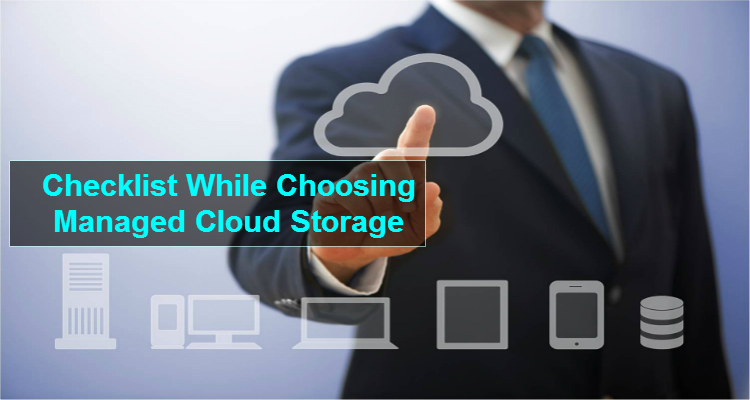The evolution of cloud computing is remarkable. The ability to provide a solution as per requirement and cost efficiency makes it more attractive to the organization. Many organization struggles when it comes to choosing a right fit for cloud storage services. Following are few aspects which will help you to choose a managed cloud storage: Segregate Data Categorizing your data may help you a lot in choosing a cloud service. Start evaluating your data natures under the headings such as mission critical, sensitive, required 24X7, and so on. This mapping of data types will help you to quickly identify what characteristics you have to look at the cloud storage while choosing a cloud storage service. For instance, Non-sensitive data may be shared on a public cloud. Whereas if your data is highly sensitive than the private cloud will suit you the best. Security and Compliance Security stands on the top of the checklist when it comes to data storage. Again the categorizations of the data type will dictate the depth of investigation and assessment required as well as the level of security needed. Service provider familiarity with compliance requirements can be a trick, so look for a provider with a track record of your industry. A provider that specializes in a specific industry understands all of the requirements in that particular industry, which is a significant factor in the provider selection process. Uptime and SLAs SLAs should contain 3 major components: > Service level objectives > Remediation policies and penalties/incentives related to these objectives > Exclusions and caveats. Service level objectives (SLOs) typically cover: accessibility, service availability (usual uptime as a percentage), service capacity (what is the upper limit in terms of users, connections, resources, etc.), response time and elasticity (or how quickly changes can be accommodated). There are often others depending on how terms are distributed between contract and SLA. SLAs should also specify how issues should be identified and resolved, by who and in what time period. They will also specify what compensation is available and the processes for logging and claim, as well as listing terms that limit the scope of the SLA and list exclusions and caveats. Close scrutiny of these terms is important, as often service credit calculations are complex – ask for worked examples or better still give all shortlist providers the same imaginary downtime scenario and compare the difference in compensation. Scalability and Flexibility The most powerful weapon of the cloud storage and cloud computing is its capability to almost instantly scale up and down to meet requirements with a single mouse click. In a managed cloud storage service, the professional who deals with the administration on your behalf will take care of your data in any scenario. In order to summarize up, I will say that while choosing a managed cloud storage providers include hard and soft factors in your assessments. Recognize and validate both the certifications and standards they adhere to, but also what their present and past clients say about them. Don't forget to check their security system. Take time to establish workable SLAs. SLAs are the main form of assurance you have that the services will be delivered as agreed.

